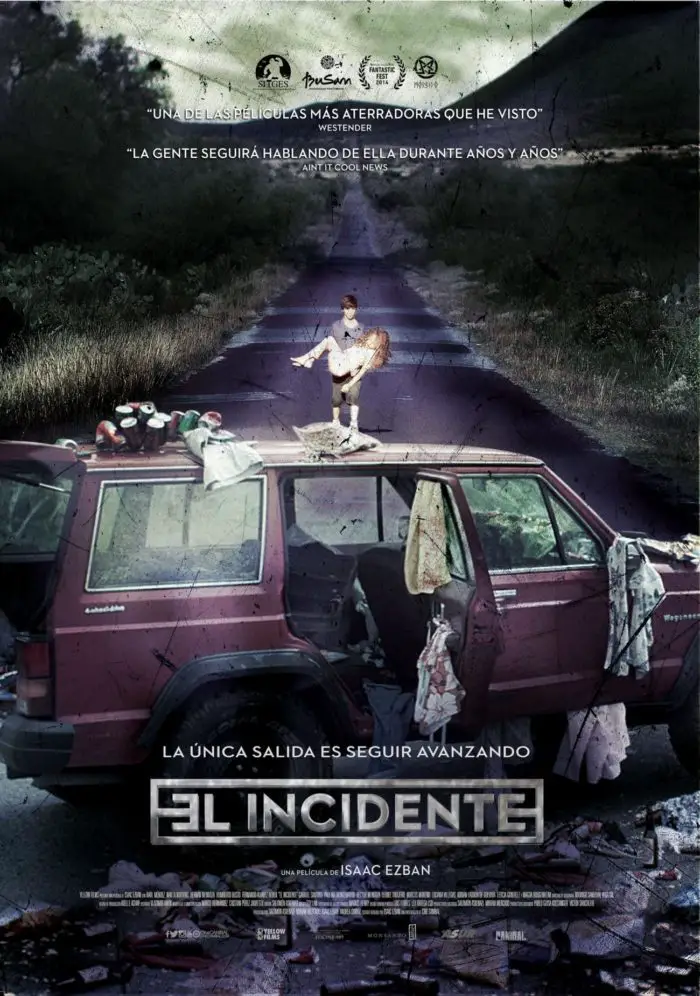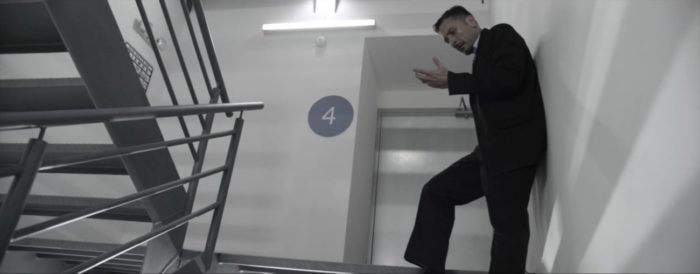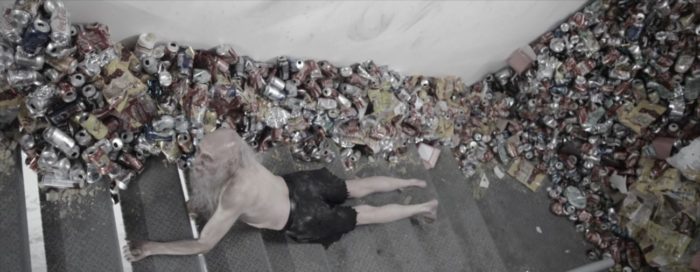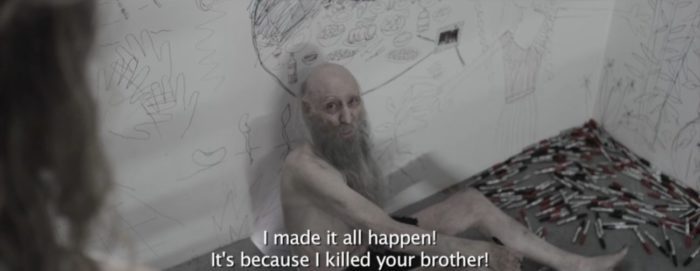When you watch between sixty to seventy films a month, you pretty much think you’ve seen it all. You find yourself revisiting favorites or constantly asking for recommendations as a countermeasure. You sometimes even resort to the endless scroll through the horror depths of free film platforms like Tubi and Midnight Pulp, hoping to strike gold. As a result, I’ve sat through my fair share of movies that try my patience. Every once in a while, a film comes to my attention that subverts my expectations and drives me to tell others about it immediately. Last week, Alix Turner sent me a film they absolutely loved and told me I should check it out. It was a film I had never heard of called The Incident (El Incidente); I haven’t stopped thinking about it since.
The Incident is a 2014 science-fiction horror thriller and the debut feature film of Mexican filmmaker Isaac Ezban. Sitting down to write this piece, I learned that Ezban is also responsible for 2015’s The Similars, a movie I found one Saturday morning while scrolling through Netflix and have recommended to friends ever since. This made it even more exciting for me to write this piece and tell you about The Incident, now knowing that Ezban was responsible for multiple film experiences worthy of conversation. Furthermore, I’ll be keeping my eyes peeled for the director’s latest film, Mal de Ojo (The Evil Eye), which is expected to release sometime later this year.

I can tell Ezban is a fan of The Twilight Zone; The Similars proved that, but The Incident really makes it known. Beginning its story with two brothers, Carlos (Humberto Busto) and Oliver (Gabriel Santoyo), trying to escape the pursuit of a corrupt police officer, Marco (Raúl Méndez), reality goes askew when the officer shoots Carlos in a stairwell. This Incident causes an auditory explosion, establishing the exact moment a rift in space and time occurs, and the stairwell becomes an endless repeating spiral.
Immediately you’re sucked into the narrative, watching Marco investigate the situation by running up and down the stairs, only to end up in front of Carlos and Oliver from each direction. The only change in the room is that certain objects have regenerated, like the vending machine, proving that they aren’t going to die of starvation in the stairwell. The initial intrigue in the concept is high with all the weird captivation of Lost, but as the trio’s denial begins to wane in favor of acceptance, the viewer starts to think, “How is this going to persist for the 100-minute runtime?” After twenty minutes, you’ve concluded that these men are stuck in this liminal space. They’ve essentially tripped into their own version of The Backrooms, and when you think about where this story could go from here, Ezban cuts away, and a parallel story emerges.
We meet Sandra (Nailea Norvind) and her two children, Daniel (Gabriel Santoyo) and Camila (Paulina Montemayor), as they prepare to embark on a lengthy road trip to Sandra’s ex-husband’s house. Sandra’s new boyfriend, Roberto (Hernán Mendoza), feels a bit uneasy about the outing. As the new beau in Sandra’s life, he doesn’t feel wholeheartedly accepted by Sandra’s children yet and strives to make a good impression. While fueling up, Roberto gives Camila a sip of his drink, causing Camila to have an allergic reaction. As with the men in the stairwell, the road-tripping characters hear the same auditory explosion, and a stretch of “The Infinite Highway” begins living up to its name.

I began thinking that the film might be an anthology. But as little clues had started popping up in both stories linking them together, it started becoming more evident that these seemingly unrelated stories were very much intertwined. A random playing card revealing the king of diamonds found in Marco’s wallet is referenced as Daniel sifts through an old magic deck, and references to dates in both timelines helped me get ahead of The Incident’s unexpected twist ending.
If you’ve come this far and are planning to watch the film, this is where I’m going to begin to get into spoiler territory. Trust me. You’ll want to discuss it further after seeing the movie. The ending is some of the best science fiction you’ll ever see, though it does seem to overwhelm people.
With no way out of their situations, Carlos and Camila meet their end, while the survivors of the event have to continue in the liminal space. Ezban does a fantastic job of catering to apt viewers who’ve caught on to the thirty-five-year difference between the stories, making it known as soon as he cuts back to the stairwell, thus letting the cat out of Schrodinger’s box. Marco is now seen as an elderly man, and Oliver has gone from being a scrawny young kid to a buff and toned man. The same can be seen on The Infinite Highway. Roberto and Sandra are nearing the end, while Daniel has pushed himself to become a model Adonis.

The Incident isn’t particularly ostentatious, and Ezban provides a masterclass on how well-made sci-fi doesn’t need expensive-looking set pieces or over-the-top special effects. The viewer gets caught up in the film’s relentless journey, engaged with the wonder of where it’s all leading and how the film will tie itself up after taking us down an inventive, complex, and original rabbit hole of a movie. The result is an exciting mesh of intoxicating storytelling with an impetus toward never-ending cycles and tendencies involving violence and grief.
Grief is especially palpable in the film. Imagine being unable to get away from someone who killed your loved one. Now imagine being saddled with the burden of causing The Incident and reliving it by seeing how you’ve changed the victim’s family for the next thirty-five years. As Marco explains to Oliver and Roberto explains to Daniel why this is all happening and what they need to do to stop it, Ezban delivers The Incident’s potent final shock and shows that these occurrences are consequences derived from growing up in a cycle of pain and misery. Our characters are revealed to be on another plane of existence, forced to repeat the mistakes of the past until someone breaks the cycle.
Yes, they are being cosmically forced into this situation by being provided with enough sustenance for thirty-five years and given the resolve to transform themselves into physical embodiments of perfection until they no longer resemble the children they once were. Marco reveals he was Daniel before causing The Incident with Carlos and Oliver. Marco gives Oliver two paths to choose from, the same choice Roberto gave him thirty-five years earlier: start the next Incident or stop the metaphoric ouroboros.

A large portion of the film’s message comes in this Lynchian twist. These characters are changed in reality but also in a metaphysical sense, and it becomes known that the liminal space is an ethereal state of being rather than an actual place. It’s only a tiny bit mind-blowing. We watch as Oliver becomes Karl, a Russian bellhop, at the end of the film. In an interview with Jon Espino, Ezban said that his ending was “open to interpretation,” there’s no wrong way to analyze the film, and each viewer will take something different away from it. That being said, I saw the film as a sort of chain reaction of actions and consequences. The Incident’s references to Philip K. Dick’s novel Time Out of Joint echo this sentiment as well.
Time out of Joint has some exceptionally paranoid qualities, similar to the theories presented by The Mandela Effect conspiracy theory and another of Dick’s short stories, We Can Remember It for You Wholesale, which has already been used as the basis for Arnold Schwarzenegger’s blockbuster, Total Recall. What I believe a lot of it boils down to is memory. Even in the thirty-five-year build-up to The Incident, most of what transpires is the perception of the event itself. Marco attests that another force was at work when the trigger was pulled, and Roberto says that he’s never been clumsier than he was holding Camila’s inhaler. This paranoia reflects that of Time out of Joint, wherein the main character believes a larger power is controlling him. However, arriving at the film’s climax, we sense the blame lies solely with the perpetrator, whose actions affect the next generation.
Both Incidents, as we first see them, look like mere accidents. When all is revealed at the end, a differentiating storyline explains the film as an encapsulation. In reality, Marco’s predisposition for violence is derived from a job that allows him to act that way. He may have started as a wide-eyed police officer hellbent on doing some good in this world, but, over time, he’s become a minefield of psychological defeats. Marco’s Incident in the stairwell leads him to come home early from work, finding his fiancé in bed with another man. After killing them, he’s sent to prison. In the metaphysical world, we see The Incident as the moment things go south in his life. Marco talks about the fact he’s getting married the next day while stuck in the stairwell, and as an old man, he realizes the decision to shoot Carlos was the start of his downfall. Both embodiments result in his being stuck in a prison of his own making.

How the metaphysical representation of the man went from being Daniel to becoming Marco is a bit more complicated. At the end of his stay on the Infinite Highway, Roberto and Daniel are called to talk to one another. Cosmically, the two are forced to have a final conversation through the utterly soul-crushing use of Camila’s stuffed animal. The metaphor of trauma isn’t lost as we see Daniel holding onto the painful memory of that day. What’s more, Daniel can no longer remember his mother, and Roberto reveals that she can no longer remember him either.
In reality, these are two different people. Despite the hiccup, Daniel’s road trip with his family in 1983 ends fine in the real world. The ending shows the kids making it to their father’s house, and Daniel grows up with a relatively normal life. What transpires in the real world from The Incident is the end of Roberto’s sobriety. Daniel is a witness to Roberto’s actions, and metaphysically, this, along with the near-death of his sister, causes Daniel to create Marco. The viewer sees the cause-and-effect relationships more closely in the metaphysical space, particularly with Sandra, who mentally retreats from the trauma Roberto has caused.
Meanwhile, in reality, the relationship between Roberto and Marco is non-existent. This is an example of the link prehistoric butterflies have in today’s world, referencing Ray Bradbury’s A Sound of Thunder. This idea, later coined “The Butterfly Effect,” suggests that even the most minor detail, like a butterfly flapping its wings, can impact the future. In this case, Roberto affects Marco’s life, which in turn affects the course of Karl’s life.

I’ve talked a lot about The Incident as science fiction up to this point, but the movie has a lot of horror qualities. Honestly, it may be one of the best purgatory movies out there, up there with the likes of Jacob’s Ladder and Wristcutters. Furthermore, the film’s principles serve as a supernatural mystery all their own. Daniel and Oliver’s characters are allowed to leave the metaphysical plane to inhabit Marco and Karl, respectively, and continue the never-ending loop of tragedy and provide the next host for the following loop. We’re never told in The Incident who or what is responsible for this cosmic divergence, but an Easter egg in Ezban’s next film, The Similars, ties both films together.
The Incident serves as an allegory for the guilt, panic, and dread one might feel in the wake of being responsible for a tragedy. In the end, the past attempts to inform the next generation, but the future always thinks it knows better. So, the process continues, the way cycles tend to do, and you can almost hear Rod Serling’s voice preparing to provide an epilogue as Karl causes one final Incident.

Astonishingly layered and superbly made from concept to conclusion, The Incident is a film I could not recommend more. The direction is award-worthy, the story is intricately woven, the set design is breathtaking, and the experience is a head trip. Guillermo Del Toro has even said, “The Incident is a powerful and clever puzzler and a promising debut for Isaac Ezban, a much-needed director of the genre in Mexico.”
If you’re a fan of idiosyncratic films imaginatively inspired by ’50s pulp science-fiction, I think you will fall head over heels for all of the director’s films. After two, I’m a devout fan. I’m certainly going to check out his other directorial feature, Parallel, and I’ll be sure to let you know when a trailer drops for Mal de Ojo.
The Incident can currently only be purchased on DVD through Amazon, while The Similars is presently streaming on AMC+. Parallel is also available through Prime Video, Peacock, Vudu, and Tubi.



